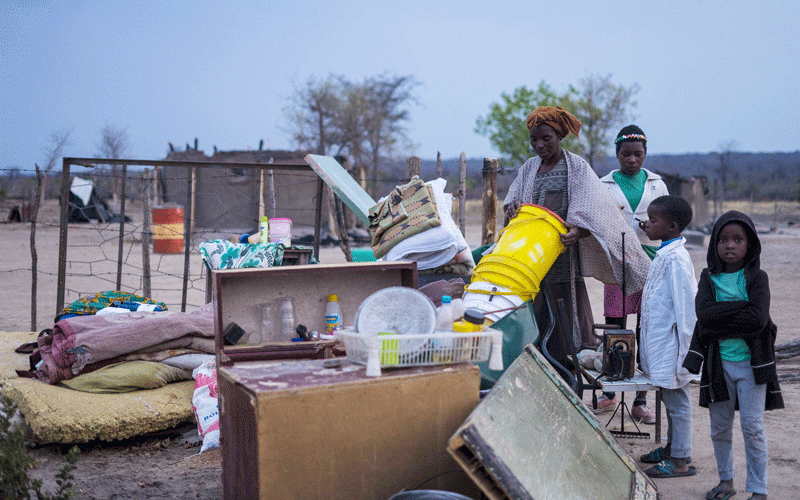
WITH winter approaching, 40-year-old Maria Chirandu from Mshagashe in Masvingo and her three children are exposed to the cold after they were forcibly evicted from their homes in February.
They have been living in a tent since then.
“It breaks my heart to watch my children try to study by candlelight in the tent,” she said while shedding tears.
“Some of their textbooks and school uniforms were lost during the demolition of our home.
“My children used to dream of becoming doctors and teachers; I fear they might not even finish their education.”
A fresh wave of evictions hit the country early this year after the government ordered the removal of thousands of families on charges that they were settled on state land illegally.
The evictions left scores of victims, including children, homeless, disrupting their education and raising concerns about access to basic necessities such as food, shelter and healthcare.
While the government insisted that the evictions were necessary for urban planning and development, the reality on the ground tells a tale of severe hardship and human suffering.
- Corruption Watch: Get scared, 2023 is coming
- Corruption Watch: Get scared, 2023 is coming
- Letters: Ensuring Africa’s food security through availability of quality seeds
- Is military's involvement in politics compatible with democracy?
Keep Reading
The evictions were suspended following a public outcry including from Zanu PF after ruling party bigwigs complained that their supporters were being harassed.
In separate interviews, the victims in Masvingo told sad stories of how they were evicted without notice, and their lives thrown into turmoil.
They are yet to receive any compensation.
Many of the women affected are single mothers or primary caregivers, responsible for the well-being of their families.
The destruction of their homes has not only stripped them of shelter but also of their livelihoods as many relied on small-scale farming or informal trading to support their households.
Another victim from Mshagashe, who chose to remain anonymous, said access to basic necessities such as shelter, food, and healthcare, was a challenge.
“I lost my job a year ago,” she said.
“This land was my only hope, a place to grow my vegetables and raise some chickens.
“Now I'm left with nothing. We travel long distances to look for water. It’s a struggle.”
She added: “We had invested our life savings into acquiring the plots.
“We bought our land seven years ago, and we had all the paperwork.”
A 15-year-old girl said the evictions affected her schooling.
“That was my only home,” she said.
“My dreams of becoming an engineer feel so far away.
"During the day, we will be looking for water and food; I no longer have time to study.”
Another 13-year-old girl said she was forced to drop out of school after her parents were evicted from their ancestral lands.
“I was in the middle of my in-class examinations when they came and said we should leave,” she said.
“I don't know when I can go back to school or if I can even finish.
“I miss my school, my friends.
“My parents are still looking for a place where we can settle.”
According to Heal Zimbabwe Trust (HZT), many families who were evicted have not been compensated.
HZT information and advocacy officer Tapiwanashe Chiriga said in areas like Chiredzi, Clipsham, Nemanwa and Bikita in Masvingo, a number of families were left with no alternative accommodation.
“The victims of the government blitzkrieg evictions programme in February and March have been left in a state of hopelessness,” Chiriga said.
“The state has not bothered itself with finding them alternative places of shelter and many of them face a cold, difficult winter with women and children seriously affected.”
Chiriga said learners had their education disrupted.
“A number of children have had their education journeys stopped too,” he said.
“While we acknowledge that the central government stopped these evictions, we urge them to assist hundreds of families who are yet to find shelter that is fit for human habitation.”
The United Nations Committee on Economic, Social and Cultural Rights General Comment 7 states that forced evictions and house demolitions are inconsistent with the norms of the United Nations Convention on Economic, Social and Cultural Rights.
According to the UN, the state has an obligation to secure alternative places of shelter for the evictees before demolishing houses.
“There must also be a humane approach to addressing this current problem,” Chiriga said.
“In areas affected by evictions and demolitions, no one has been offered alternative land and no temporary shelter has been provided even to the elderly, the poor and persons with disabilities.
“A nation that fails to take care of its vulnerable populations in such circumstances has completely lost its sense of humanity and empathy.”
Public Service, Labour and Social Welfare minister July Moyo did not respond to questions sent to him last week.
Several attempts to obtain a comment from Moyo were fruitless as he was not answering his mobile phone However, human rights groups and members of parliament have condemned the evictions as heartless. According to Chiriga, the evictions exposed the unresolved land question in Zimbabwe.
“A clear demarcation must be set on the authority of local councils and traditional leaders while the law and policy must be succinct on ending illegal partisan distribution of land,” Chiriga said.
Transparency International Zimbabwe’s executive director Tafadzwa Chikumbu said there was rampant corruption in the allocation of land.
“According to our research on urban and peri-urban, the final beneficiary for a piece of land is the one who suffers the most out of illegal settlement,” Chikumbu said.
“We identified that the culprits are either those who work for local authorities, land barons, officials in the Ministry of Land and other politically connected people across the country.” Chikumbu said there was a need for the government to investigate the irregular distribution of land.
“When these evictions are taking place, they only focus on the individual on the land; they don’t invest in identifying how the individual acquired the land and who benefitted from the sale of the land,” he said. “They just focus on evicting people.”
Opposition Citizens Coalition for Change Chipinge South legislator, Clifford Hlatywayo called for urgent amendments to out-dated land laws to protect the rights of the local communities.
“We cannot use laws that were enacted during the colonial era; those laws were meant to take the land from the blacks,” Hlatywayo said.
“That is why we are calling for amendments of laws like the Communal Lands Act so that we protect the majority and the poor citizens.” He said there were widespread abuses in land allocation and ownership, often at the expense of impoverished citizens.
“The majority of Zimbabweans are in the rural areas, so if we want to empower them we have to amend the law,” Hlatywayo added. “Right now they are like lodgers, they do not have stands.
“Our people should be given title deeds so that there is consultation at least when their land is taken by the government.”
The evictions saw a total of 180 villagers, including individuals in their 90’s being charged with occupying “gazetted land without lawful authority” under the Gazetted Land Consequential Provisions Act.
In Masvingo, the villagers dragged the government to the High Court challenging the evictions.
In an application filed on February 4 at the Masvingo High Court, the villagers said they wanted their matter referred to the Constitutional Court for a determination of the constitutionality of their eviction.
*This story was produced with support from the WAN-FRA Women in News Social Impact Reporting initiative






